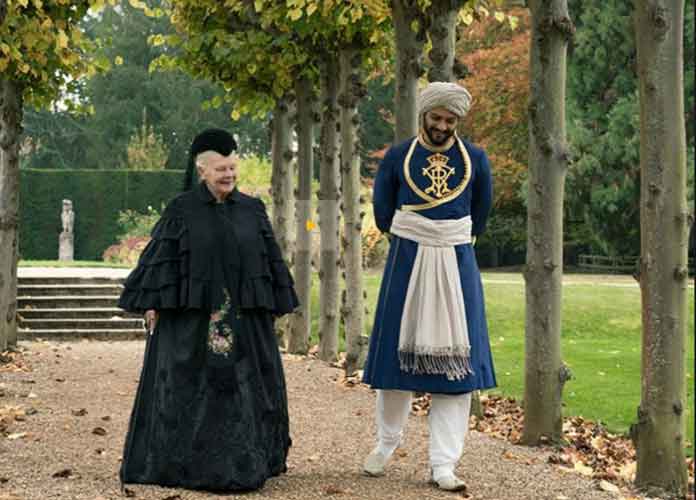‘Victoria & Abdul’ Move Review: Heartwarming Tale Of Shocking Friendship

4/5
England’s Queen Victoria had always been known for being a very progressive woman for her time, although Victoria & Abdul presents this image of the legendary monarch in an entirely new light.
Victoria & Abdul Review
Abdul Karim (Ali Fazal) is a young clerk in late nineteenth-century Mumbai (then Bombay) who comes from a humble family of carpet designers. One day, he is invited to contribute as a manservant to Queen Victoria’s (Judi Dench) golden jubilee (the fiftieth anniversary of her accession to the throne) in 1887. The good-natured Indian is joined by a cantankerous manservant named Mohammed (Adeel Akhtar) to attend to the Queen of the United Kingdom and Empress of India during her grand feast and in the subsequent days.
Karim is excited to be in London and sees this as an opportunity of a lifetime, while the disgruntled Mohammed repeatedly says the British simply want to exploit them and suggests Karim not get his hopes up too much. However, Karim quickly becomes much more than a servant to Queen Victoria after gaining her affection. He becomes her confidante, friend and teacher, or Munshi, who introduces her to unknown pleasures like mangoes (which were only produced in India at the time) and instructs her in his native language, Urdu, among other things. The monarch’s personal staff and family, including her physician and petulant son Bertie (Eddie Izzard) — Edward VII, Prince of Wales —are outraged by her fondness for Karim, and try to end the relationship by any means necessary.
Director Stephen Frears (The Queen, Philomena, Florence Foster Jenkins) and screenwriter Lee Hall (Billy Elliott, Pride & Prejudice, War Horse) deliver a wonderfully authentic portrayal of the fierce friendship between Queen Victoria and one of her servants, with a film based on the novel of the same name by Shrabani Basu. Oscar-winner Dench is stellar as Queen Victoria: she shifts from unabashed ennui to child-like wonder and excitement with genuine ease, and confidently displays how utterly unafraid the legendary ruler was of being judged for her unconventional customs and tastes. Dench previously played Queen Victoria in the 1997 film Mrs. Brown, which told a similar story except it involved the monarch developing a close rapport with a Scottish servant named John Brown (Billy Connolly).
Fazal also shines as the benevolent Abdul, who seems to take so much in stride despite suffering waves of threats, insults and abuse from the Queen’s staff. The amalgamation of humor and drama in the film is also refreshing. Queen Victoria’s staff’s reactions to their superior growing closer to Abdul, along with Mohammed’s continuously moody intonations, provide pleasant, unforced comic relief. Top if off with beautiful — yet not overdone — costumes and set designs, and what results is a fantastically produced film.
The film also shares connections to other notable films about British royalty. Queen Victoria was the great-grandmother of King George VI and King Edward VIII, who were played by Colin Firth and Guy Pearce respectively in the 2010 film “The King’s Speech.”
It would have been nice to see more of what becomes of Abdul after the Queen dies, although perhaps that will be saved for another film.
RELATED ARTICLES
Get the most-revealing celebrity conversations with the uInterview podcast!








Leave a comment